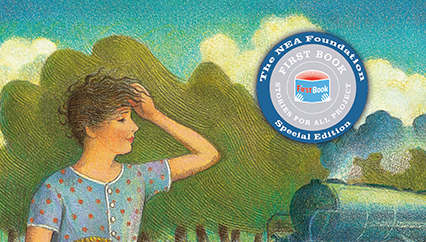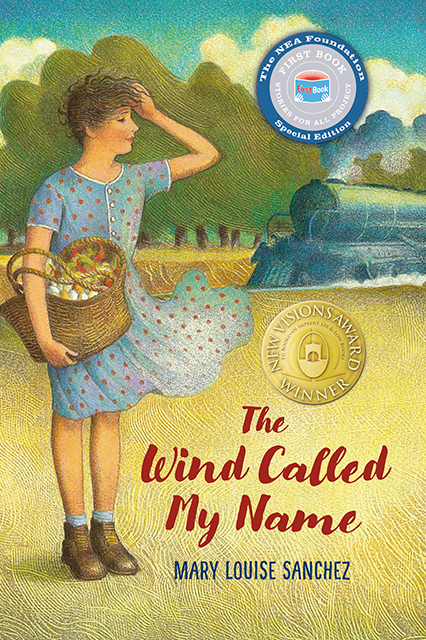
Q&A with Mary Louise Sanchez, author of “The Wind Called My Name”
 Today we wish a happy “book birthday” to The Wind Called My Name – a middle-grade historical fiction novel about a young Latina girl & her family settling in Wyoming during The Great Depression.
Today we wish a happy “book birthday” to The Wind Called My Name – a middle-grade historical fiction novel about a young Latina girl & her family settling in Wyoming during The Great Depression.
We here at First Book are particularly excited to see this title hit bookshelves today! Its author, Mary Louise Sanchez, is the winner of publisher Lee & Low’s New Visions award – an honor given each year to a previously-unpublished author of color. With generous funding from the NEA Foundation, Lee & Low has expanded their New Visions award to publish multiple authors each year, and to create special-edition paperback editions of the books for the First Book Marketplace.
Read more about our partnership with NEA Foundation and Lee & Low, and the expansion of the Stories for All TM section of the First Book Marketplace.
We had the honor of teaming up with Lee & Low to ask author Mary Louise Sanchez questions about writing The Wind Called My Name and winning the New Voices award. Here’s what she had to say:
The Wind Called My Name is partially inspired by your own mother’s experience growing up in Wyoming. Can you share a bit about the family connection, and which pieces of your mother’s childhood made it into the book?
Mary Louise Sanchez: On my mom’s first trip to town, she really did believe the sky would be a different color; and she said she wrote a fan letter to Shirley Temple and received a reply. It’s true that at a young age my mom was responsible for helping her blind abuela maneuver her surroundings. Of course, all the food references are foods my family has eaten for many generations and we continue to prepare and enjoy them. In fact, at one book launch party, we will serve empanadítas which my sister has already prepared and frozen.
At one Fort Steele school Christmas program, my mom received a gift which she always said validated her and made her believe in the magic of Christmas. I always knew this was the perfect ending for The Wind Called My Name. I just had to make up the beginning and the middle!
You are a retired schoolteacher and librarian. How did those professions inform your writing of this novel?
MLS: How blessed I was to have review sources which helped me select the best books for my school community. The children and teachers I worked with always responded well to books I shared, and I could see that the books impacted my school community emotionally. As I wrote my story, I wanted readers to have that same experience. I know the well-crafted stories I read and continue to read have influenced my writing.
What advice would you have for schoolteachers and librarians who have a story they’d like to publish?
MLS: Read, read, read–especially those books by authors that resonate with you and your students. Also, read how-to-write books with your story in mind. Join and attend writing organizations like the Society of Children’s Book Writers and Illustrators and submit your stories for critiques, even when it’s intimidating. Get a supportive critique group to help you edit and revise your work. Your stories will be stronger when you are ready to submit to agents and editors. Be patient!
I would also say, encourage the youth to think about pursuing a path that could lead to publication.
What was it like to find out you had won Lee & Low’s New Visions Award?
MLS: My initial reaction was –surprise! I submitted the manuscript earlier than the deadline and later thought I should have sent it in at the last moment so the judges would remember it better.
Then I was humbled to realize that my story was honored by a publishing house I’ve respected for many years. I often ordered books for my school from Lee & Low, and now The Wind Called My Name would belong to their canon of books like Baseball Saved Us. I’m so proud to be part of a team that values and honors diversity in their staff, authors/illustrators, and stories.
What did the research process look like for this book? What resources, experts, or primary sources did you rely on?
MLS: My dad’s younger brother, Manuel, was the expert I relied on for northern New Mexico Spanish. My mom’s older sister, Felícita (Phyllis) gave me her viewpoints on attending school and family life in Fort Steele, Wyoming in the 1930s. It was delightful to visit Fort Steele with her last summer as she shared her story growing up there. When I needed to know various job descriptions for Union Pacific railroaders, my baby brother, Patrick, was my go-to-man.
Books and internet resources gave me background on the culture of the 1930s. I also consulted a research book, The Spanish Language of New Mexico and Southern Colorado,which gave me background on the language the Nueva España colonists spoke which is still spoken to this day. I own over three hundred books on New Mexico and one of those books, Refranes: Southwestern Spanish Proverbs, was invaluable as a resource for the dichos in the book. My New Mexican saint books and other saint books helped me choose the most appropriate saint for each chapter.
Why do you feel it’s important for kids to have books with different types of protagonists in their libraries?
MLS: Kids get validation when the protagonists are similar to them. It’s also good for kids to enter into cultures different from their own, and learn to see these protagonists as role models navigating their worlds and solving their problems.
The relationship between Margarita and her best friend Caroline is fraught at times, but evolves over the course of the book. What do you think readers today can learn from this example of cross-cultural friendship? Cross-cultural friendships at young ages can only help children become empathetic adults who can relate to others with different viewpoints and life experiences. These kinds of friends develop communication skills needed in their present and future relationships, which can help make this a better and kinder world.
Why do you think it’s important to include the stories of families like the Sandovals in the teaching of American history?
MLS: What do we lose when those voices are left out? All people in the United States have rich heritages –mine included — which have and continue to impact American history. When we listen to these voices and value them, I believe it unites us and makes us a stronger country.
